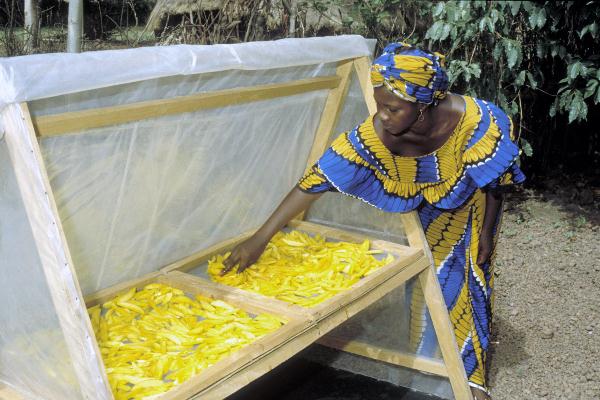
A woman drying mango in Senegal. Reducing food losses can make great inroads towards food security and increased nutrition. Photo: ©FAO/Roberto Faidutti
First ever day against food loss and waste to be marked tomorrow, 29 September
The first ever International Day of Awareness of Food Loss and Waste will be marked tomorrow with a call to action for African countries to bolster their efforts and encourage private sector investments to reduce food losses and waste.
The Food and Agriculture Organization of the United Nations (FAO) estimates that food losses in sub-Saharan Africa add up to $4 billion annually.
Across Africa, the vast majority of food loss happens between harvest and the point of sale – very little is wasted by consumers after purchase. Some of the leading causes of food loss in Africa are a lack of cold chain facilities especially for perishables, unreliable and inadequate storage facilities and insufficient agro-processing skills among smallholder farming communities.
“The COVID-19 pandemic has triggered a wake-up call for the need to radically transform our food systems to make them more efficient and sustainable for people and planet. Tackling food loss and waste, and particularly post-harvest loss reduction, in Africa is essential to achieve that goal,” FAO Assistant Director-General and Regional Representative for Africa Abebe Haile-Gabriel said on the eve of the international day.
COVID-19 drives up food losses
According to FAO analysts, the COVID-19 pandemic has caused consumers in many low-income countries to purchase only staple carbohydrates and non-perishables, resulting in perishable food often being wasted in markets. Physical distancing measures in some countries have reduced the number of customers in markets, also resulting in increased food losses and reduced incomes for traders.
Studies commissioned by FAO before the pandemic estimate that on-farm losses in sub-Saharan Africa for fruits and vegetables are up to 50 percent, the highest in the world. For cereals and pulses, the on-farm losses are up to 18 percent, equal highest in the world with parts of Asia.
When food is lost or wasted, all the resources that were used to produce the food, including water, land, energy, labour and capital, are also wasted.
Transforming food systems to reduce loss and waste
Reducing food losses on farms and at harvest time, particularly in countries with high levels of food insecurity, can make great inroads towards food security and improved nutrition.
Such changes are a responsibility shared by governments, the private sector, civil society, development agencies, research and academic institutions, and consumers.
To mark tomorrow’s international day, governments and decision makers are being called on to target investments and create incentives to bolster efforts to reduce food losses. Education campaigns targeted at consumers on the meaning of “use-by” and “best before date” labelling are also encouraged, particularly in urban centres in developing countries, where food waste shows an increasing trend.
Operators along the food supply chain, including retailers, are being called on to scale up their actions to reduce food loss and waste, and research institutions and academia are urged to further develop innovations that can be rapidly put to good use.
Snapshot of FAO’s actions for reduced food loss and waste
Through an FAO project with the African Union and The Rockefeller Foundation in Kenya, Tanzania, Zambia and Zimbabwe, practical storage solutions such as hermetically-sealed bags that can store grain for longer, and improved crates to transport fresh fruits and vegetables to reduce damage during transportation were piloted and adopted by stakeholders. Policy support was also provided to African Union member countries through the African Union Commission to guide the scale-up of these successes and other solutions. A continental post-harvest management strategy was also developed.
Through Agricultural Transformation Centres in Africa, FAO is linking farmers to agro-processing hubs which have been strategically located in high-production areas. In Zambia, for example, FAO is working with the government and communities to equip women’s groups to start food processing initiatives such as turning ground nuts into nutritious nut paste.
FAO, the International Fund for Agricultural Development and the World Food Programme have jointly implemented a project funded by the Swiss Agency for Development and Cooperation (SADC) in Burkina Faso, the Democratic Republic of Congo and Uganda targeting the estimated 35 percent of on-farm losses in cereals and pulses.
In Ethiopia, FAO with funding support from SADC, is supporting farmers to use metal silos and hermetically-sealed bags, and the private sector, particularly young entrepreneurs, are being encouraged to fabricate the silos for household grain storage, among other project activities. In Eswatini, Tanzania, Uganda and Zambia are participating in an FAO-led global project to strengthen weaknesses along the food supply chain that could lead to food loss and waste.
The UN General Assembly adopted a resolution in 2019 designating the International Day of Awareness of Food Loss and Waste to be observed each year on 29 September. FAO facilitates observance of the day globally, in collaboration with the UN Environment Programme (UNEP). (End)
Stop food loss and waste. For the people. For the planet.
